Health
Opthalmologist: These Nutrients Can Protect Your Sight From Macular Degeneration

Your eyesight is precious! So you want to do everything possible to avoid the changes you’re told are a normal part of aging — like trouble seeing at night and cloudy vision. And you can! Research continues to prove that a little TLC and the right nutrients can strengthen your eyes as well as prevent macular degeneration.
Research in JAMA Ophthalmology reveals that the number of people with age-related macular degeneration (AMD) is more than 2.75 times higher than previously thought. The disease causes loss in the center of the field of vision and is triggered by deterioration of the retina (dry AMD) or leaky blood vessels under the retina (wet AMD). Says Jason Miller, MD, PhD, an AMD specialist at the University of Michigan Kellogg Eye Center: “The earliest warning sign is blurring of your central vision or difficulty seeing at night and in low light.” Distortions in central vision, such as straight lines being bent, can also be a sign.
The challenge, however, is that AMD can be significantly advanced before these symptoms occur, he adds. This is why regular visits to an ophthalmologist are helpful. During these exams your pupils are dilated, giving the physician a clear and unobstructed view inside the eye to see any signs of disease. These visits are especially key if you’re over age 50, have a family history of AMD and/or have been a smoker, all of which increase your risk of developing the disease.
Is there a test for macular degeneration?
Yes! Thankfully, a tool that doctors use to detect vision changes that could be related to macular degeneration is one you can easily use at home. It’s called the Amsler grid, and you can print it out and use it to check your vision daily. You simply hold the grid of squares with a dot in the middle at normal reading distance (about 12 to 14 inches from your face). Using just your right eye (close the left one), look at the center dot, making sure you can see the whole grid. If any lines look blurry or distorted (or are missing), write down what you see. Repeat with the left eye. Call your ophthalmologist immediately if you see any new changes.
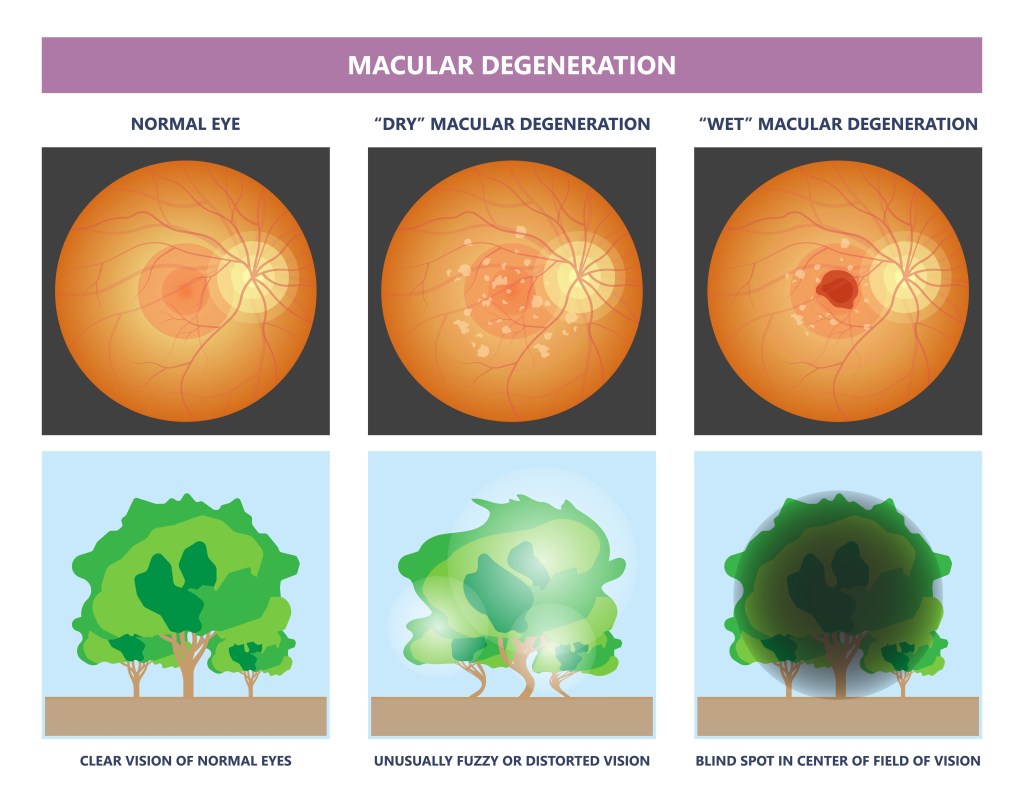
Can macular degeneration be reversed?
There is no cure for macular degeneration, but a supplement with a vitamin/mineral combination called AREDS2 can decrease risk of disease progression if you’re diagnosed with AMD, says Dr. Miller. This formula, which includes a specific combination of lutein (10 mg), zeaxanthin (2 mg), vitamin C (500 mg), vitamin E (400 IU or 180 mg), zinc oxide (80 mg or 25 mg) and cupric oxide (2 mg), is available in several supplements including NatureMade Vision with AREDS2 Formula (Buy on Amazon, $15.99). “There was a very large randomized controlled trial that showed the specific benefit of this combination. But it was only proven to work in patients with intermediate AMD.”
How to prevent macular degeneration
Since there’s no cure for AMD, the best strategy is to prevent it. And while a simple habit like wearing sunglasses (doing so shields eyes from UV and blue light that can cause AMD-triggering retinal damage) is smart, more and more sound science is revealing many nutritional and lifestyle strategies that can help. Here are a few:
Start your day with OJ
Enjoying a daily glass of fresh orange juice lessens AMD risk by up to 65%, say Australian investigators. That’s because OJ is packed with flavonoids that nourish the eyes to ward off damage that can trigger AMD. Tired of orange juice? Peach juice is another great source of flavonoids.
Eat spinach daily
Baby spinach is one of nature’s top sources of nitrates, and adding a handful of this leafy green to your smoothie or salad can protect your eyes from AMD. The reason? Your body easily converts nitrates into nitric oxide, a molecule that dilates blood vessels and improves blood flow to the retina. In fact, an Australian study found that people who ate the most leafy greens were up to 35% less likely to develop AMD than those who rarely ate them. (Click through for our favorite recipe for creamed spinach.)
Savor a golden sip
Relaxing with a warm cup of “golden milk” significantly reduces the oxidative stress that sets AMD in motion, say Italian researchers, who credit the spice’s curcumin for the benefit. What’s more, a University of Oklahoma study suggests curcumin shields against light-induced damage that can trigger AMD. To make golden milk: combine 1 cup of warm milk or almond milk with 1 tsp. of turmeric; stir in cinnamon, ginger and honey to taste. Or try a pre-made mix like Organifi Gold (buy on Organifishop, $69.95).
Try a healing combo of key nutrients
Supplementing with a combination of zeaxanthin (the ‘eye nutrient’), lutein and saffron can protect your eyes from damaging inflammation that contributes to AMD. Indeed, University of Wisconsin researchers found that boosting levels of zeaxanthin slashes AMD risk by 46%. And a study in JAMA suggests lutein lowers AMD risk up to 43%. Bonus: Saffron has been shown to noticeably improve both contrast sensitivity and visual clarity. A product with all three nutrients: Life Extension MacuGuard (Buy on LifeExtension, $29).
But even getting these nutrients on their own can help keep your vision sharp. To get the perks, try nibbling a handful of goji berries — a strategy that can boost levels of zeaxanthin by 300%, say researchers in the International Journal of Ophthalmology. (Click through for details on how goji juice cured one woman’s chronic brain fog.) Not a fan of this dried, sweet-tart fruit? Raw spinach, green peas, pumpkin and pistachios are also packed with the vision-saving nutrient.
Get your B vitamins in
A study in the Archives of Internal Medicine found that the risk of developing AMD dropped by 34% among subjects who supplemented with 50 mg of vitamin B6, 2.5 mg of B9 (folate) and 1mg of B12, while another showed that the same combination resulted in lower levels of the protein homocysteine, which is associated with inflammation and an increased risk of developing AMD.
Even better, get your Bs from the wide variety of delicious foods rich in the nutrients. To get B12, chose animal livers, beef, sardines, clams, salmon, nutritional yeast and eggs; foods rich in folate include dark leafy greens, beans, sunflower seeds and whole grains; and sources packed with B6 include pork, fish, poultry, whole grains and eggs. More good news: Getting plenty of B vitamins also lowers your risk of developing cataracts, diabetic retinopathy and glaucoma.
For more vision news, keep reading!
3 Simple Tricks to Sharpen Your Vision in a Snap
Treating This Common Eye Condition Could Significantly Reduce Your Risk of Dementia
Are Your Eyes Constantly Dry? You May Have This Common Yet Highly Undiagnosed Disorder
This content is not a substitute for professional medical advice or diagnosis. Always consult your physician before pursuing any treatment plan.

Health
Many families take patients off life support too soon after traumatic brain injuries: study

Many patients who died after traumatic brain injuries may have survived and recovered if their families had waited to take them off life support, a new study found.
Researchers from Massachusetts General Hospital, Harvard Medical School and other universities analyzed “potential clinical outcomes” for patients with traumatic brain injury (TBI) who were removed from life support, according to a press release.
The study included 1,392 patients who were treated in 18 trauma centers across the U.S. over a 7½-year period.
HUNDREDS OF RURAL HOSPITALS ARE IN DANGER OF SHUTTING DOWN, STUDY FINDS: ‘AT RISK OF CLOSURE’
Using a mathematical model, the researchers compared patients for whom life support was withdrawn to similar patients who were kept on life support.
Among the group for whom life support was not withdrawn, more than 40% recovered at least some independence, according to a press release.
Many patients who died after traumatic brain injuries may have survived and recovered if their families had waited to take them off life support, a new study has found. (iStock)
The researchers also discovered that the notion of remaining in a vegetative state was an “unlikely outcome” six months after injury.
When designing the study, the team didn’t know what to expect, according to study author Yelena Bodien, PhD, of the Department of Neurology’s Center for neurotechnology and neurorecovery at Massachusetts General Hospital.
HOME HOSPITAL CARE BRINGS ‘PHENOMENAL’ BENEFITS TO PATIENTS AND PROVIDERS, STUDY FINDS
“Our anecdotal experience was that some families are told their loved ones had no chance for recovery, they would never walk, talk, work or have a meaningful relationship again — yet they chose not to discontinue life support and their loved one made a remarkable recovery,” she told Fox News Digital.
“On the other hand, clinicians are under a lot of pressure to make early prognoses and do not want to commit someone to a life that would never be acceptable to them, so it could be that those patients who died after life support was withdrawn would have had very significant impairments otherwise.”

“Our anecdotal experience was that some families are told their loved ones had no chance for recovery … yet they chose not to discontinue life support and their loved one made a remarkable recovery,” a researcher said. (iStock)
“I think there are two stories here,” said Bodien.
“One is that some patients with traumatic brain injury who died because life support was withdrawn may have recovered, but the other is that many would have died even if life support was continued.”
A patient’s prognosis after severe traumatic brain injury is highly uncertain, she noted. “Sometimes patients with the most devastating injuries survive and make meaningful recoveries.”
“Families can advocate for delaying a decision to discontinue life support if this is aligned with what they believe their loved one would want.”
The problem, Bodien said, is that health care providers lack the tools required to determine which patients with devastating injuries will recover, to what extent they will recover — and how long that will take.
‘Very important’ study
Dr. Marc Siegel, clinical professor of medicine at NYU Langone Medical Center and a Fox News medical contributor, was not involved in the research but said it was a “very important” study.
“Previous research shows a high-level recovery from mild TBI and a significant recovery percentage even with moderate to severe injury,” Siegel told Fox News Digital.
HEAD INJURY ASSOCIATED WITH DOUBLED MORTALITY RATE, 30-YEAR STUDY REVEALS
“After head trauma, the brain may swell, and the use of mannitol and steroids and even sometimes surgery — where the top of the skull is removed — can be used to decrease pressure on the brain and increase chance of a full recovery,” he continued.
Rehabilitation is also crucial, Siegel added.
“All of these tools should be given a chance to work in most cases.”

Health care providers lack the tools required to determine which patients with devastating injuries will recover, to what extent they will recover and how long that will take, a researcher said. (iStock)
Based on the study findings, Bodien recommended that clinicians should be “very cautious” with “irreversible decisions” like withdrawing life support in the days following traumatic brain injury.
“Families should also be aware of our results so that they can advocate for delaying a decision to discontinue life support if this is aligned with what they believe their loved one would want,” she added.
Limitations of the research
There were some limitations to the study, Bodien said.
“The sample size of the study was small, which made it difficult to find an adequate number of participants who did not have life support discontinued and were clinically similar, or ‘matched,’ to those who had life support discontinued,” she told Fox News Digital.
CLICK HERE TO SIGN UP FOR OUR HEALTH NEWSLETTER
Among the participants who did not have life support discontinued, the researchers were not able to follow all of them for a six-month period.
Another limitation is that the researchers used clinical variables that were available on the day of, or the day after, hospitalization — but sometimes decisions to discontinue life support are made several days later.
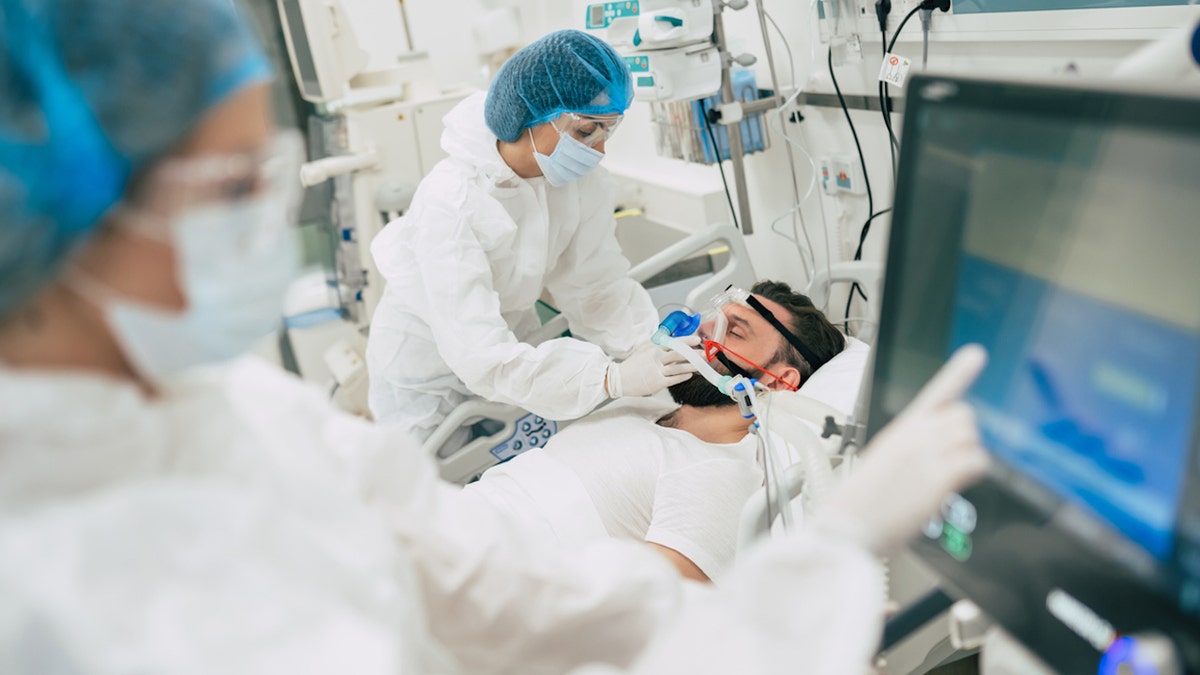
Based on the findings, study author Yelena Bodien (not pictured) recommended that clinicians should be “very cautious” with “irreversible decisions” such as withdrawing life support in the days following traumatic brain injury. (iStock)
“There are many considerations that may lead to a decision to discontinue life support after traumatic brain injury that we were unable to factor into our analyses,” she continued.
“For example, personal beliefs, religion and advanced directives could all affect decision-making but were not captured in our study.”
Bodien also noted that the Harvard study was focused on traumatic brain injury and cannot be generalized to other injuries and illnesses.
For more Health articles, visit www.foxnews.com/health.
Health
7 important health stories you might have missed this week: Catch up here

Every day of the week, Fox News Digital publishes a range of health pieces to keep you up-to-date on the most important wellness news.
We cover cutting-edge medical research, breakthrough medications, mental health challenges, personal medical dramas and more.
In case you missed them, here are a few of our biggest health stories from this week.
CLICK HERE TO SIGN UP FOR OUR HEALTH NEWSLETTER
You can see a full list of recent health pieces at http://www.foxnews/health.
1. Hunger could be tied to sleep, expert says
If you’re feeling hungrier than usual lately, your sleep routine could be the culprit. A nutritional biologist offers tips for regulating sleep and curbing unhealthy cravings. Click here to get the story.
The food you eat can determine the quality of your sleep, according to experts. Here are the latest findings. (iStock)
2. Health agencies issue bird flu update: ‘Alert, not alarmed’
The CDC and WebMD teamed up this week to deliver an hour-long update on Thursday about the current bird flu outbreak. Fox News Digital breaks down the most important points. Click here to get the story.

Experts assured the public that drinking pasteurized milk remains safe. (iStock)
3. Melanoma patients share their stories
For Skin Cancer Awareness Month, two melanoma patients are speaking up about their symptoms, treatment and prevention tips to help others avoid the potentially deadly disease. Click here to get the story.
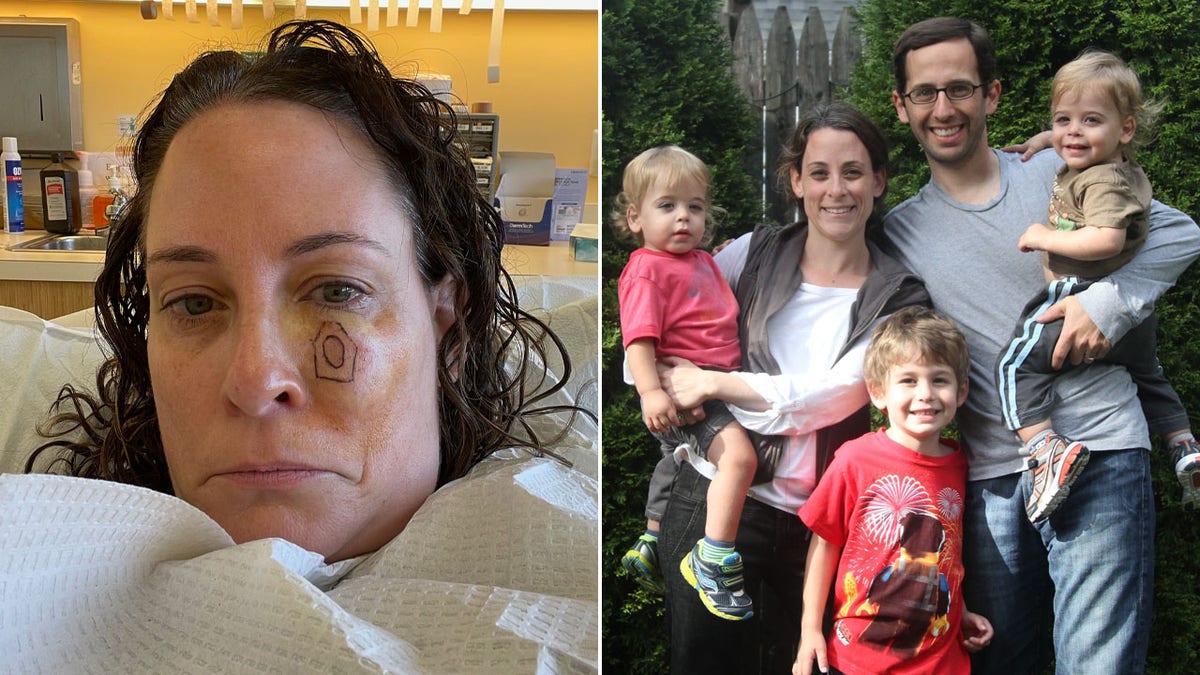
Abby Weiner, pictured at left and at right with her husband and sons, was diagnosed with melanoma in Oct. 2023. (Abby Weiner)
4. Report reveals staggering discrepancy in health care costs
Patients with private health insurance could be charged up to 300% more than those with Medicare, a new report reveals. Doctors explain the reasons for the sticker shock. Click here to get the story.
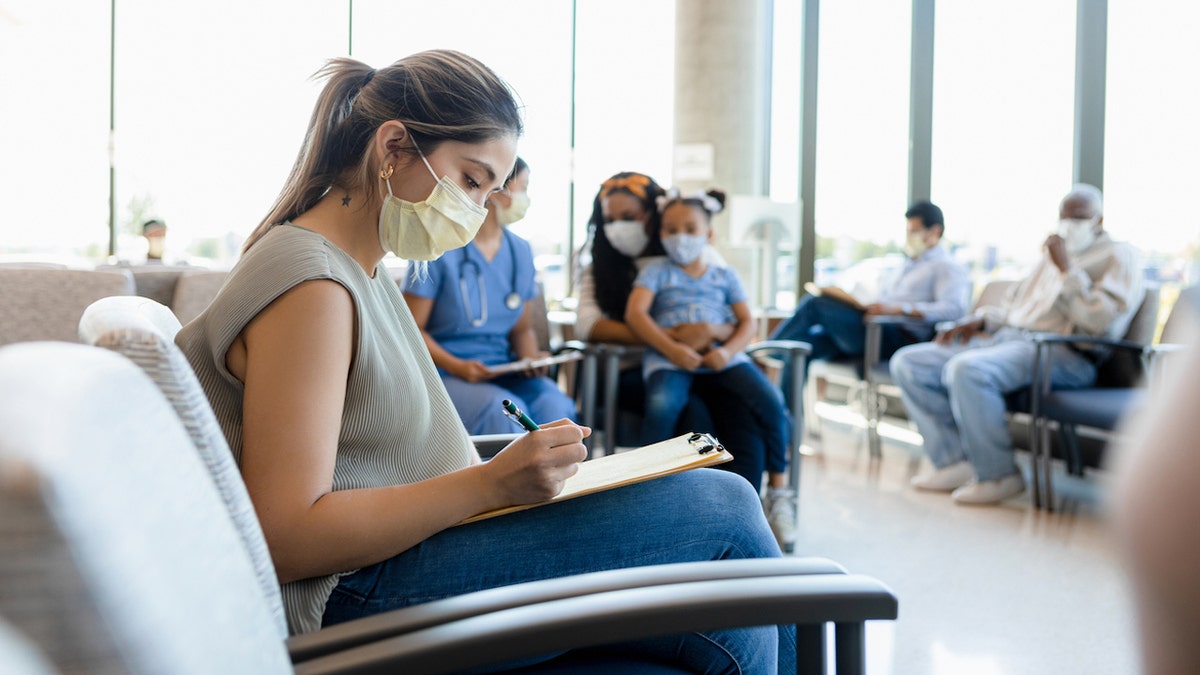
The new report published the names and pricing models of more than 4,000 U.S. hospitals. (iStock)
5. Pastor shares important message about depression
A Dallas pastor who fought his own depression battle shares how he overcame the disease – and why it’s so important for those in church leadership to seek help when they need it. Click here to get the story.

Mark Dance, pictured with his wife, Janet Dance, said he suffered through a three-year period of depression while serving as a pastor. (Dr. Mark Dance)
6. Nurse’s depression is cured through breakthrough tech
A Chicago nurse struggled with COVID-19-related PTSD and depression for years until electrical brain tapping therapy finally gave her a new lease on life. Click here to get the story.
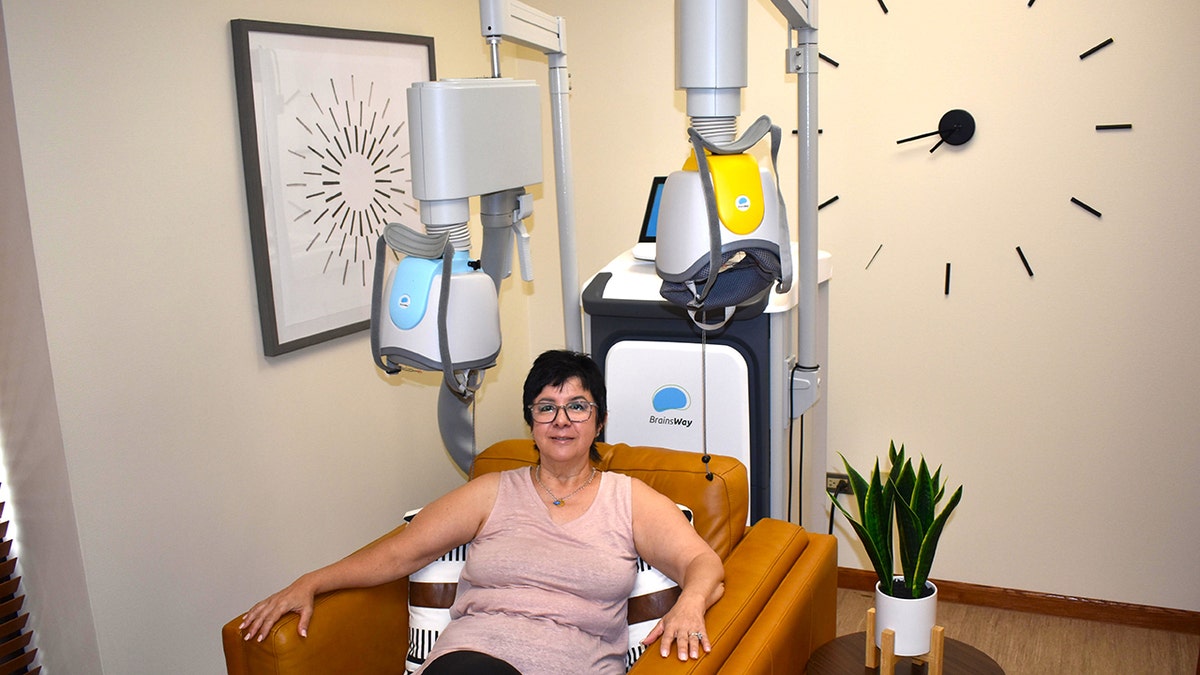
“Had I not had this treatment today, I don’t know where I’d be,” the patient told Fox News Digital. (Melanie Eilers)
7. Young vaper shares warning after nearly dying
A 22-year-old man in Nebraska required a double lung transplant due to vaping. Jackson Allard shares his story as a cautionary tale. “I had a 1% chance to live,” he said. Click here to get the story.

This week’s health stories have included a pastor’s depression journey, the sleep-hunger connection, health care cost discrepancies, bird flu updates and more. (Mark Dance, iStock)
For more Health articles, visit www.foxnews.com/health.
Health
Introducing Our Product Reviews Team, and How We Review | Woman's World

Sign Up
Create a free account to access exclusive content, play games, solve puzzles, test your pop-culture knowledge and receive special offers.
Already have an account? Login
Forgot your password?
Get back to the Sign In
Use left and right arrow keys to navigate between menu items.
Use escape to exit the menu.
-

 News1 week ago
News1 week agoSkeletal remains found almost 40 years ago identified as woman who disappeared in 1968
-

 World1 week ago
World1 week agoIndia Lok Sabha election 2024 Phase 4: Who votes and what’s at stake?
-

 Politics1 week ago
Politics1 week agoTales from the trail: The blue states Trump eyes to turn red in November
-

 World1 week ago
World1 week agoBorrell: Spain, Ireland and others could recognise Palestine on 21 May
-

 World1 week ago
World1 week agoCatalans vote in crucial regional election for the separatist movement
-

 Politics1 week ago
Politics1 week agoNorth Dakota gov, former presidential candidate Doug Burgum front and center at Trump New Jersey rally
-

 Movie Reviews1 week ago
Movie Reviews1 week ago“Kingdom of the Planet of the Apes”: Disney's New Kingdom is Far From Magical (Movie Review)
-

 World1 week ago
World1 week agoUkraine’s military chief admits ‘difficult situation’ in Kharkiv region
/cdn.vox-cdn.com/uploads/chorus_asset/file/23249791/VRG_ILLO_STK001_carlo_cadenas_cybersecurity_virus.jpg)












